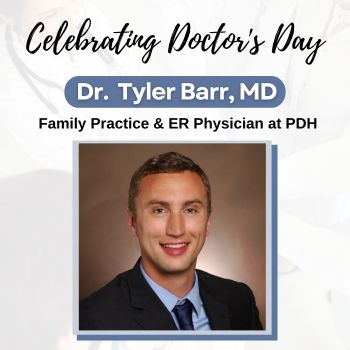March-29-2024

What inspired you to become a doctor, and why did you choose this particular field of medicine?
"I was always very interested in the sciences and I thought initially I thought I would be a bench scientist with a PhD. I also enjoyed teaching so I was considering that as a route as well for my undergrad. I felt a little pushed away from medicine, knowing how much they worked and how much debt that they take on. Despite these reservations, I went into bench science work, only to find it too theoretical for me. I enjoy interacting with people, being around them, and helping them more directly. During this exploratory period, I had a friend who talked me into shadowing a family physician. While shadowing I thought, “Oh this is actually really cool!”. I really liked what the physician’s day to day work was. You have the opportunity to teach patients things about the body, and there is obviously a lot of science involved in medicine. Around the same time, I was taking anatomy and physiology classes in my undergrad and my interest in the human body grew and I wanted to continue to learn more about it. That is when I realized that the medicine path suited me."
Can you share a memorable experience from your medical career that had a significant impact on you?
"I remember this one time during my second year of medical school when I was working in the pediatric emergency department. It was still early in my clinical rotations, so I was very “wet behind the ears”. I was working with another medical student, and we had this young patient come in with really bad elbow pain. We tried everything we could think of to figure out what was wrong, ordering X-rays and running through different possibilities, but we just couldn't crack it. We spoke to the attending physician and they knew immediately what is was. With a quick maneuver, they fixed the problem – turns out it was 'nursemaid elbow,' something I hadn't encountered before. The patient was smiling and better in a matter of minutes! It was so cool to see a problem be diagnosed and solved by hand so quickly, just by having prior experience in seeing the issue in other patients. It was very gratifying, memorable, and makes you realize just how much there is to learn."
How do you approach building a strong doctor-patient relationship, especially in a small, close community like ours?
"I believe that trust and open communication is the cornerstone of any healthy doctor-patient relationship, especially in a close community. It's important for patients to feel comfortable being honest with me, and that starts with me being transparent and honest with them. Even though Patients may not always do the things that you ask them to do, you have to continue to treat them with respect and understanding. It's essential to meet patients where they are and listen without judgment. Building trust takes time and effort, but it's incredibly rewarding. It often helps to speak from my own personal experience if it allows me to relate to someone on a personal basis."
What attracted you to our rural community, and what do you hope to contribute to the healthcare here?
“I've always been drawn to rural, mountainous communities, having grown up in the mountains of Colorado. Despite not knowing much about California, I was encouraged by a colleague from the ER who used to work at Plumas District Hospital. She said, “I used to work in this town called Quincy. It was really cool, you should check it out.” Her enthusiasm about Quincy piqued my interest, and I decided to explore further. I was able to work with the ER department, do some rotations, and get familiar with the group and the community. What struck me about Quincy was its unique charm – it's not too big, not too bustling, but still has a lot of opportunities, especially in the realm of outdoor recreation. From the first time I visited, I always felt that Quincy would be a great place to live.
Unlike some other rural areas I've visited where the medical providers seemed a bit out of touch or impersonal, the team here at Plumas District Hospital felt different. They were knowledgeable, friendly, and genuinely committed to their patients' well-being. There are a great group of medical providers here. Most doctors here work in the hospital and the clinic while maintaining good continuity with their patients. I will be working in the Emergency Room in addition to seeing patients in the clinics. I hope to be a good, quality doctor for the patients in this community.”
Are there any specific medical initiatives or services you are passionate about bringing to our community?
“Ultrasound is an area that I have quite a bit of hands on experience in. I teach with an organization that provides education and training regarding bedside ultrasound skills, called Hospital Procedure Consultants. Bedside ultrasound allows you to diagnose many potential issues with patients, including musculoskeletal, obstetrics, cardiac, pulmonary, etc. It is fast, efficient, and should save patients time while providing them with more information. I hope to help with bringing more bedside ultrasound into the clinic and hospital, while helping bring others up to speed with that practice.”
In your opinion, what are the unique healthcare challenges and opportunities in a small, rural setting compared to larger urban areas?
“When you are in a mountainous, remote area like Quincy, transportation can prove to be a challenge for people to get the care that they need. They may need specific services that they have to travel for. The road conditions, snowy weather, combined with an aging population, can prove a challenge for some to access care, even in Quincy.”
How do you stay up to date with the latest medical advancements while providing personal care in a community setting?
“If you look at medical knowledge over time, it is exponential in its growth. A hundred years ago, even 50 years ago, medical knowledge was easier to understand and stay up to date with. Today, the growth of knowledge and medical treatments has grown significantly. It is part of the reason that more medical professionals are specialized today. I listen to a lot of podcasts and I read a lot to try and stay up to date.
One thing that I learned early on is that if you really listen to your patients, they can teach you a lot. Personal care is key as every patient is unique and different. If I can’t answer the patient’s question, I tell them. While some may expect me to have all the answers, it is important to be honest with them in the present moment, and then dedicate time to digging into a question after a visit.”
Are there any hobbies or interests outside of medicine that you enjoy, and how do you plan to engage with the community beyond your professional role?
“My family is a big part of my life. I enjoy spending a lot of time with them. One of my favorite hobbies is One-Wheeling. People will definitely see me riding around town on that thing. I enjoy mountain biking and I am looking forward to getting into more snow sports around Quincy. I want to get involved with the local Search and Rescue team. I hear that some physicians are involved with the school district, volunteering at local sporting events. We will see what comes up!”
What do you see as the strengths of our local healthcare system?
“I think you have a strong medical staff at Plumas District Hospital. Most hospitals in rural communities really struggle to attract quality physicians and retain them. I have also been impressed with PDH’s administration team as well. They have done a lot to keep the hospital district and the clinics financially sound. This is important in an environment where you see a lot of smaller hospitals closing. As far as I can tell the hospital is currently well run, which is very important for the health of the community.”
Anything else you would like to share?
“We are excited. It will be a big change for us, having lived in Ventura for the last seven years. I am excited to get back up to the mountains and to live in a small town again. Looking forward to jumping in and to get involved with the community of Quincy with my family!”


Stay connected with your healthcare team and access your personal medical information anytime online with HealtheLife.
Patient Portal Information